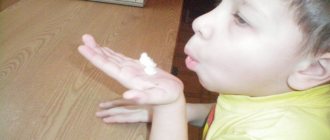There is a joke - first parents wait for the child to speak, and then they can’t wait for him to shut up.
Little explorers of the world are called “why girls”, they are interested in everything and with their questions and conversations they are able to “chat” the most patient mother. However, there are also silent people. Now all the peers are talking with all their might, but this kid doesn’t even say “mom.” From a certain age, this situation causes justifiable concern among parents.
When should you worry?
Each child has a “convenient” pace of development. One began to babble earlier, the other was the first to sit down or stand up, and the third walked and spoke before his comrades in the sandbox. If age-related variations occur within a couple of months, there is no need to worry.
However, all parents need to know the norms of children’s speech development. If the lag becomes significant (and speech therapists consider a delay of no more than 2-3 months to be a normal option for a particular skill), it is better to seek advice from a specialist.
Children usually begin to say the notorious word “mother” by the age of one or one and a half years. What if the first birthday has been celebrated a long time ago, but the long-awaited word is still missing? Is it time to go to the doctors?
Consulting a specialist never hurts. When it comes to speech development, you shouldn’t wait for everything to form “somehow on its own.” However, in order not to panic ahead of time, take a closer look at your baby. It is quite possible that he is simply a little delayed in pronouncing the words so expected by his parents and nothing terrible happens. Important factors:
- A one-year-old child understands speech addressed to him. That is, it responds to its own name and gives an adequate reaction to the words of its parents.
- There are no hearing or vision impairments.
- The baby's cooing was replaced by babbling speech. The child is already trying to designate specific words with some kind of imitative syllables.
- In games, there is a noticeable desire to repeat after an adult and perform given actions.
At an early age, the process of speech formation is closely related to the development of the psyche and thinking. Parents should keep an eye on these aspects. If any suspicions still arise, it is best to seek advice from specialists.
Who to visit:
- neurologist;
- child psychologist;
- speech therapist-defectologist.
Rule 5. Sing songs and don't finish them
This technique gives the child the experience of “speech” before he actually begins to speak. The baby inserts a syllable into a familiar song and feels that he can say what he can do. And this attitude encourages him to try to pronounce words again and again.
How to arrange everything? A well-known song that your baby has heard a hundred times will suit you. Start singing it and suddenly pause before the end of the word in the line. For example:
“The duck went for a walk, to dive in the warm lake, Swimmed around the lake, quack-quack - ... The duck called the ducklings, come back, Four ducklings came home, oh-oh-...
If you take breaks in songs and fairy tales regularly, this will serve as an excellent springboard that will push your child to active speech.
Don’t rush to predict all your child’s wishes. In order to ask you for something, the baby must at least want it. If any desire of the little one is predicted in advance, he simply does not have the basis for a “conversation” with you.
How to teach a child to say “mama”?
So, if your baby, according to doctors, is developing in accordance with the norm, he does not have any special problems, but for some reason he has not started talking, parents can force things a little.
The main condition for the correct formation of speech is communication. The biggest misconception of some mothers and fathers is that they think that the child does not understand them yet, and therefore there is no need to talk to him. This is not true at all!
The more you communicate with your baby, the more words will be in his passive vocabulary. This means that over time they will become active. In addition, it is by listening to speech addressed to him that the child learns to speak!
How to communicate with a small child:
- Use the correct forms of words in your speech. Undoubtedly, many kids say “bo-bo” about a scratch or “beep-beep” about all types of transport. This sounds very nice, but parents should not make it easy for their child to learn. Let the “long” words remain in a passive form for some time, but over time the baby will speak as he should!
- Try to speak in simple words that the child can understand. Repeat them many times every day.
- Speak as clearly as possible and face your baby. It is by “reading” articulation that the child learns to pronounce new words.
- Create the illusion of dialogue. Ask questions and answer them yourself. But take a short break, give the child the opportunity to insert a familiar word at one point.
- Talk about everything. Comment on the process of dressing, washing, talk about what you see while walking, and so on. After all, the baby learns the world with the help of his parents.
- Do not turn on television or radio in the background. Such sounds are not perceived by small children as speech, which means they will not teach him anything.
- Use your pacifier less often. How will a baby talk if his mouth is always busy? In addition, constant sucking can ruin your bite and lead to poor articulation.
“You are my chicken, monkey, piglet”
Whatever loving parents call their children. All this leads to the depersonalization of the child, as if he does not exist, but there is some kind of toy with which you can do whatever your heart desires. At the beginning of their life, your son or daughter will perceive any word spoken uncritically, they will trust you. Tell your child that he is a fool instead of “you need help, let me explain,” and the child will accept it. Let me give you an example: a mother, in an educational impulse, told her son that he was a coward. As a result, when meeting the boy, he introduced himself like this: “My name is Vanya Ivanov, I’m a coward.” When you hear something like this, it should be an incentive to think about how you communicate with your own child. A person's name is his presentation to the world. In some families, it turns out that it moves and comes up with a lot of funny names for the child, but in vain! The name should always be in the foreground; this is how a person will subsequently feel himself in this world, how complete he will be. If you more often call your daughter or son a chicken or a devil, then you seem to be biting off pieces of his name (his personality).
How speech develops by the age of two
The ability to speak consciously develops in children gradually, like imitation of the speech of adults - first unconsciously, and then consciously. This process is divided into conditional stages:
- Scream. A newborn baby screams as his first breath fills his lungs with air. For now, this is the only way for the baby to express discomfort. Soon the cry takes on various shades and becomes expressive. Parents quickly determine the cause of discontent by the intonation of the cry;
- Booming. In the period from 2 months to six months, the child begins to walk, pronounce various vowel sounds, training the speech apparatus. The baby likes such experiments, so humming expresses positive emotions and satisfaction;
- Babble. After six months, children learn to pronounce syllables. This can happen either at 7 months or at 11, there is no clear time frame. Within a few weeks, the toddler masters almost all consonant sounds;
- Words. It is not necessary that the baby’s first word will be “mom”; often the speech starters are monosyllabic “give” or “na”, a request for “drink” or imitation of animals “woof”, “meow”, etc. By one year, a child actively uses about 10 words, often distorting their pronunciation;
- Conscious speech. By the age of two, children's vocabulary includes 100-300 words. Two-year-olds can call their parents and ask them for something. Children often talk about themselves in the third person.
The period from two to three years is an incredibly important stage for the development of speech: children, like a sponge, absorb new words, repeat them many times, trying to understand the meaning and norms of pronunciation. If at 2 years old a child does not speak at all, this is a reason to be wary and look for new ways to develop the baby’s speech.
Who should you run to for help?
When a child does not begin to speak for a long time or symptoms characteristic of mental development disorders are clearly visible, parents should contact specialized psychoneurological preschool institutions for professional assistance. If this is not possible, it is worth showing the baby to a speech therapist, psychologist, and possibly a neurologist. Physiotherapy, art and music therapy specialists can provide professional assistance in the formation and development of speech in young children.
The development of children's speech requires the most serious attitude, because the further development of the baby, to whom quite serious demands are already being made, depends on this. Today it is no longer enough for a child to be able to simply talk and, at the very least, express his thoughts by the age of six. Modern requirements are such that even before entering first grade, a child must be the “owner” of a rich vocabulary, and also be able to read, parse words into letters and sounds, and write. Therefore, it is necessary to devote a significant amount of time to activities with children, especially if the child is diagnosed with a delay in speech development. The sooner parents pay attention to this and begin corrective activities, the better results can be achieved.
Everyone has their own time
It is generally accepted that a child first pronounces the word “mother” at about one to one and a half years.
Of course, a six-month difference is a lot, but each baby has its own, individual development schedule. Therefore, for the time being, parents have nothing to worry about. The little one didn’t say the cherished word at one year old, but he will say it at one year and three months. Or a year and a half. We just need to wait a little. It’s another matter if, even after one and a half years, the child does not try to say anything. In this case, there may be some disturbances in the baby’s development, and therefore you should definitely seek medical advice. If the baby develops somehow incorrectly, the doctor will prescribe treatment.
But if everything is normal with the child’s health, and the baby is delayed in development for natural reasons, mom and dad should help him say the long-awaited word “mom.”











